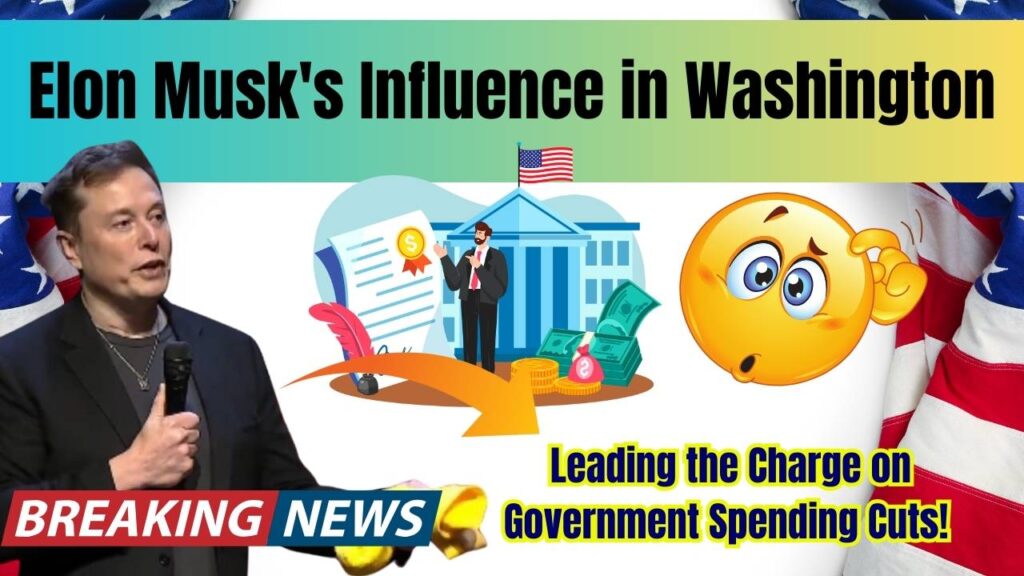Elon Musk’s Influence in Washington – Elon Musk, the billionaire entrepreneur known for his work with Tesla, SpaceX, and Neuralink, has taken on a new challenge: cutting government spending in Washington, D.C. His influence in the political sphere has grown significantly, with his advocacy for fiscal responsibility and efficiency in federal operations.

With government debt soaring past $34 trillion, Musk has become a vocal critic of wasteful expenditures, calling for bold reforms in Washington. As lawmakers debate budget reductions, Musk’s approach—rooted in efficiency, technological innovation, and market-driven principles—has captured the attention of policymakers and the public alike.
Elon Musk’s Influence in Washington
| Topic | Key Details | Source |
|---|---|---|
| Elon Musk’s Role | Advocating for reduced government spending, improved efficiency, and accountability | WhiteHouse.gov |
| Government Debt | Exceeds $34 trillion, prompting discussions on budget cuts | US Treasury |
| Proposed Spending Cuts | Defense, foreign aid, and bureaucratic expenses targeted for reduction | Congressional Budget Office |
| Musk’s Philosophy | Market-driven efficiency, reduced bureaucracy, and leveraging technology | Various speeches & interviews |
Elon Musk’s push for government spending cuts is reshaping the debate on federal budgeting. His market-driven approach emphasizes efficiency, cost reduction, and technological innovation to optimize taxpayer dollars.
As Washington grapples with fiscal challenges, Musk’s ideas—while controversial—are forcing a critical discussion on financial responsibility. Whether policymakers adopt his vision remains to be seen, but one thing is clear: government efficiency is now a national priority.
Why Is Musk Pushing for Government Spending Cuts?
For years, Washington has struggled with managing its budget, leading to repeated debt ceiling debates, government shutdowns, and growing concerns over fiscal sustainability. Musk, who has built his empire by optimizing costs and maximizing efficiency, sees an opportunity to apply Silicon Valley-style management to government finances.
He has criticized wasteful government programs, excessive foreign aid, and bloated bureaucracy, arguing that taxpayers deserve better financial stewardship. His message resonates with fiscal conservatives and business leaders who believe the federal budget needs serious reform.
Government Spending Trends Over Time
Government spending in the U.S. has fluctuated based on economic conditions, wars, and political priorities. Key moments include:
- The New Deal (1930s): A significant expansion of government programs during the Great Depression.
- Post-WWII Boom (1940s-1950s): Heavy military investments alongside economic prosperity.
- Reagan-Era Tax Cuts (1980s): Increased military spending while reducing taxes.
- Recent Years (2000s-2020s): A mix of war spending, stimulus packages, and rising entitlement costs.
Musk’s approach seeks to curb the rapid growth of government expenditures seen over the past two decades.
Musk’s Vision: Key Areas for Government Spending Reductions
Musk has outlined several key areas where he believes government spending should be reduced or optimized:
1. Reducing Bureaucratic Waste
Musk frequently criticizes government inefficiency, pointing to agencies that spend billions on outdated systems and redundant programs. For example:
- The Pentagon’s $500 million failed cloud computing project
- Excessive regulatory staff in federal agencies, creating delays and inefficiencies
- Mismanaged infrastructure projects with ballooning costs
By implementing private-sector principles like automation, AI-driven decision-making, and performance-based assessments, Musk believes the government can operate more efficiently at a fraction of the cost.
2. Cutting Unnecessary Foreign Aid
The U.S. spends over $50 billion annually on foreign aid, supporting various international programs. Musk argues that some of these funds should be redirected toward domestic infrastructure, education, and innovation.
His view: “America should take care of its own before spending billions abroad.”
3. Optimizing Military Spending
While a strong national defense is crucial, military spending exceeds $850 billion per year. Musk advocates for:
- Increased reliance on private-sector space and defense innovation (like SpaceX reducing NASA’s launch costs by 90%)
- Cutting outdated programs that consume billions without results
- Reducing administrative overhead in defense agencies
4. Improving Social Program Efficiency
Musk has suggested revamping social programs to ensure they reach those in need without waste.
- Digitizing government services to reduce fraud and administrative costs
- Introducing blockchain technology for transparent spending
- Evaluating means-testing for welfare programs
Public Reaction and Political Backlash
Musk’s proposals have sparked mixed reactions:
- Supporters praise his focus on efficiency and reduced taxation.
- Critics argue that some cuts could harm vulnerable populations and lead to unintended consequences.
- Lawmakers remain divided, with conservatives generally favoring his approach while progressives push for alternative solutions.
Potential Technological Solutions Musk Might Propose
Given Musk’s background, he is likely to advocate for technology-driven solutions to cut costs, including:
- AI-powered government decision-making to reduce paperwork and administrative delays.
- Blockchain technology for transparent government transactions.
- Automated budgeting software to optimize spending allocations.
February Social Security Payments – First Round Being Sent Out on 12th February
OPPO Redesigns Smartwatch BP Monitoring – No More Air Nozzle!
Whose Portrait Is on the $50 Bill? Check Details About New U.S. Currency Bill
Wisconsin Social Security Updates in 2025 – What’s Changing and How It Affects You!
FAQs about Elon Musk’s Influence in Washington
Q: What is Elon Musk’s role in government spending cuts?
A: Musk is advocating for reduced federal spending by applying private-sector efficiency principles to government operations. While not an elected official, his influence in policy discussions is growing.
Q: What areas does Musk believe should be cut?
A: Musk has suggested reducing bureaucracy, foreign aid, and military spending inefficiencies, while improving the efficiency of social programs through technology.
Q: Is there bipartisan support for spending cuts?
A: Yes, but the approach varies. Some favor Musk’s efficiency-driven strategy, while others advocate for a mix of cuts and revenue increases to balance the budget.
Q: How would Musk’s plan affect the economy?
A: Cutting wasteful spending could lower taxes and reduce national debt, but aggressive cuts may impact jobs and essential services. The challenge is finding a balanced solution.







